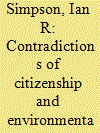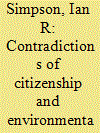|
|
|
Sort Order |
|
|
|
Items / Page
|
|
|
|
|
|
|
| Srl | Item |
| 1 |
ID:
170228


|
|
|
|
|
| Summary/Abstract |
This article scrutinizes the limitations of environmental citizenship among citizens and non-citizens in the Arab Gulf states, with a focus on the United Arab Emirates (UAE). There are particularly heightened concerns about water scarcity, food security, marine pollution, and dependence on oil and gas industries and how states can address these challenges in the Gulf Cooperation Council (GCC). Yet environmental citizenship in the Indian Ocean’s Arabian littoral remains poorly understood both in terms of theoretical and grounded questions. This article considers how labor relations and discourses relating to citizenship, environment and sustainability enable or foreclose environmental reform in GCC countries. It shifts the technological and economic focus predominant in literature on sustainability in the GCC to take a more social perspective and examine distinctions between citizens and non-citizens and the depoliticising of environmental claims and national industrial legacies.
|
|
|
|
|
|
|
|
|
|
|
|
|
|
|
|
| 2 |
ID:
173820


|
|
|
|
|
| Summary/Abstract |
This article scrutinizes the limitations of environmental citizenship among citizens and non-citizens in the Arab Gulf states, with a focus on the United Arab Emirates (UAE). There are particularly heightened concerns about water scarcity, food security, marine pollution, and dependence on oil and gas industries and how states can address these challenges in the Gulf Cooperation Council (GCC). Yet environmental citizenship in the Indian Ocean’s Arabian littoral remains poorly understood both in terms of theoretical and grounded questions. This article considers how labor relations and discourses relating to citizenship, environment and sustainability enable or foreclose environmental reform in GCC countries. It shifts the technological and economic focus predominant in literature on sustainability in the GCC to take a more social perspective and examine distinctions between citizens and non-citizens and the depoliticising of environmental claims and national industrial legacies.
|
|
|
|
|
|
|
|
|
|
|
|
|
|
|
|
| 3 |
ID:
156472


|
|
|
|
|
| Summary/Abstract |
This paper studies the economic and environmental impacts of foreign direct investment (FDI) in China. First, we build a simple theoretical model to predict the overall beneficial effects of FDI, and also find that a stronger sense of “environmental citizenship” by the FDI firm is associated with lower pollution and lower emission intensity in the host region. For empirical analysis, we use Spatial Durbin Model (SDM) to address the regional spillovers of FDI and pollution in China, and confirm the beneficial impacts of FDI both environmentally and economically. We also find that FDI from Hong Kong, Macau, and Taiwan (HMT) that is assumed to exhibit a stronger sense of environmental citizenship due to its closer ties with mainland China, significantly improves the host region's environmental outcome but has no measurable effects on its economic growth; in contrast, FDI from other origins significantly promotes the economic growth of the host economy although it has no measurable impacts on the environmental outcome.
|
|
|
|
|
|
|
|
|
|
|
|
|
|
|
|
| 4 |
ID:
090648


|
|
|
|
|
| Publication |
2009.
|
| Summary/Abstract |
Drawing from the work of Andrew Dobson, two notions of citizenship in civil society can be distinguished: environmental citizenship, which focuses on environmental rights and seeks to redefine the relationship between the state and the citizen; and ecological citizenship, which goes beyond a rights-based notion of citizenship to advocate the fair usage of ecological space across international borders. Using civil society initiatives to conserve forests, this article argues that these two notions of citizenship should be seen as overlapping in that civil society groups seek to work through national and international law to reduce the ecological footprint of some countries on others. The article concludes by drawing a distinction between the environmental state and the ecological state.
|
|
|
|
|
|
|
|
|
|
|
|
|
|
|
|
| 5 |
ID:
170223


|
|
|
| 6 |
ID:
175424


|
|
|
|
|
| Summary/Abstract |
As marine ecosystems decline globally, scientists recommend increasing the coverage of marine protected areas (MPAs), but many are not effectively managed to deliver benefits. Community integration into decision-making can increase effectiveness by supporting behavior change, but this poses implementation challenges. We examine differences in adaptive capacity, community engagement, and perceived MPA benefits using interviews and focal groups in two fishing communities from MPAs with different management strategies and geographic settings: a centrally managed MPA in Kenya and a co-managed MPA in Tanzania. Far fewer Kenyan community members (37%) felt they benefited from the MPA compared to Tanzanian community (95%). Agency, trust, and MPA support were largely similar. Both systems had challenges that reduced collaborative action including: low staff-community interaction and communication, leadership challenges, and social conflict. We identified pathways towards improved co-management that transcend systems: institutional prioritization of community integration, investment in community leadership, mapping social networks, and adequate MPA budgets.
|
|
|
|
|
|
|
|
|
|
|
|
|
|
|
|
|
|
|
|
|